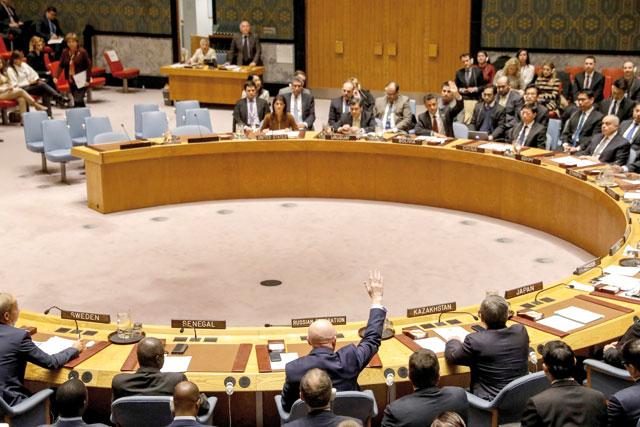You are here
Russia, US stalemate over Syria chemical weapons inquiry
By Reuters - Nov 14,2017 - Last updated at Nov 14,2017
UNITED NATIONS — Russia said on Monday it was talking to the United States about the UN Security Council renewing an international inquiry into chemical weapons attacks in Syria, but Washington countered that Moscow had refused to engage on a US-drafted resolution.
The mandate for the joint inquiry by the UN and the Organisation for the Prohibition of Chemical Weapons (OPCW), which has found the Syrian government used the banned nerve agent sarin in an April 4 attack, expires on Friday.
Russia vetoed an initial US bid to renew the joint investigation on October 24, saying it wanted to wait for the release of the latest investigation's report two days later. It has since proposed its own rival draft resolution.
“We are talking to the US, it’s not over yet,” Russian UN Ambassador Vassily Nebenzia told reporters on Monday.
The inquiry’s report found the Syrian government was responsible for the April 4 attack using sarin in the opposition-held town of Khan Sheikhoun, killing dozens of people. The Syrian government has denied using chemical weapons.
“Russia has refused to engage on our draft resolution — which the vast majority of council members agree is the most viable text — in spite of our multiple attempts to consider Russian concerns”, a spokesman for the US mission to the United Nations said on Monday.
A resolution needs nine votes in favour and no vetoes by Russia, China, the United States, Britain and France to pass. The council unanimously created the inquiry, known as the Joint Investigative Mechanism (JIM), in 2015 and renewed it in 2016.
“It is important that the JIM is renewed but on an updated mandate because the systemic errors that we saw with the recent report should be corrected and that’s the aim of our resolution,” Nebenzia said.
He added that if the mandate of the inquiry was not renewed, “it may send a bad signal, but the way the investigation has been conducted sends an even worse signal.”
The JIM previously found that Syrian government forces were responsible for three chlorine gas attacks in 2014 and 2015 and that Daesh militants used mustard gas.
“The draft text Russia put forward without any negotiation is unhelpful, has no support, and cannot be taken seriously,” said the spokesman for the US mission.
Syria agreed to destroy its chemical weapons in 2013 under a deal brokered by Russia and the United States.
Related Articles
UNITED NATIONS, United States — Russia on Tuesday vetoed a US-drafted resolution that would have granted a one-year extension to the mandate
UNITED NATIONS, United States — Russia cast a second veto in as many days at the United Nations Security Council on Friday to block the rene
THE HAGUE — A preliminary report by the world’s chemical weapons watchdog said “various chlorinated chemicals” were found at the site of an


















